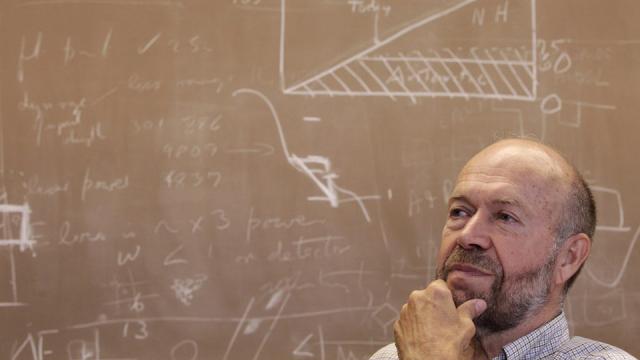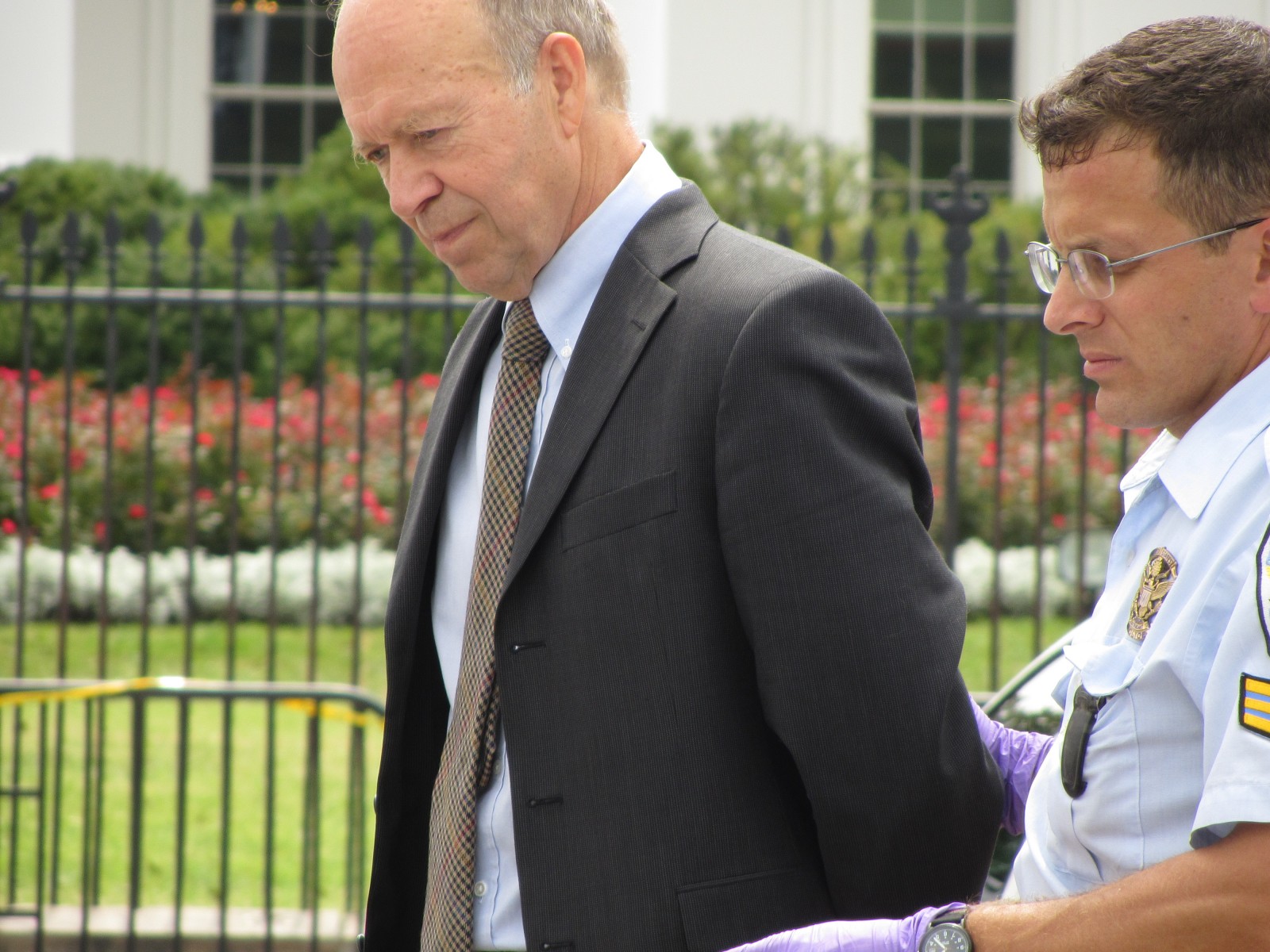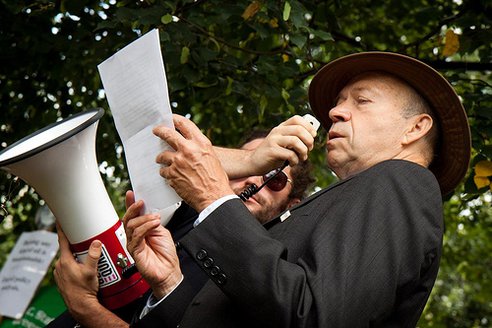
Major international oil companies are buying off governments, according to the world's most prominent climate scientist, Dr. James Hansen. During a visit to London, he accused the Canadian government of acting as the industry's tar sands salesman and "holding a club" over the U.K. and European nations to accept its "dirty" oil.
"Oil from tar sands makes sense only for a small number of people who are making a lot of money from that product," he said in an interview with the Guardian. "It doesn't make sense for the rest of the people on the planet. We are getting close to the dangerous level of carbon in the atmosphere and if we add on to that unconventional fossil fuels, which have a tremendous amount of carbon, then the climate problem becomes unsolvable."
Hansen met ministers in the U.K. government, which the Guardian previously revealed has secretly supported Canada's position at the highest level.
Canada's natural resources minister, Joe Oliver, has also visited London to campaign against E.U. proposals to penalize oil from Alberta's tar sands as highly polluting. "Canada can offer energy security and economic stability to the world," he said. Oliver also publicly threatened a trade war via the World Trade Organization if the E.U. action went ahead: "Canada will not hesitate to defend its interests."
The lobbying for and against tar sands has intensified on both sides of the Atlantic as the E.U. moves forward on its proposals, which Canada fears could set a global precedent, and President Barack Obama considers approving the Keystone XL pipeline to transport tar sands oil from Canada to the U.S. gulf coast refineries and ports. Canada's president, Stephen Harper, was met by protesters when he visited New York last week to tell audiences that KXL "absolutely needs to go ahead."
Canada's tar sands are the third biggest oil reserve in the world, but separating the oil from the rock is energy intensive and causes three to four times more carbon emissions per barrel than conventional oil. Hansen argues that it would be "game over" for the climate if tar sands were fully exploited, given that existing conventional oil and gas is certain to be burned.
"To leave our children with a manageable situation, we need to leave the unconventional fuel in the ground," he said. Canada's ministers were "acting as salesmen for those people who will gain from the profits of that industry," he said. "But I don't think they are looking after the rights and well-being of the population as a whole.
"The thing we are facing overall is that the fossil fuel industry has so much money that they are buying off governments," Hansen said. "Our democracies are seriously handicapped by the money that is driving decisions in Washington and other capitals."
The E.U. aims to penalize oil sources with higher carbon footprints, as part of a drive to reduce the carbon emissions from transport called the fuel quality directive (FDQ). But Canada, supported by the U.K., is fiercely opposed: "We are not saying they should not move to reduce emissions," said Oliver. "But the proposed implementation of the FQD is discriminatory to oil sands and not based on scientific facts." However, Europe's commissioner for climate action, Connie Hedegaard, said the FQD was "nothing more, nothing less" than accurate labeling and putting a fair price on pollution.
Hansen, who informed the U.S. Congress of the danger of global warming in 1988, has caused controversy before by saying the "CEOs of fossil fuel companies should be tried for high crimes against humanity" and calling coal-fired power plants "factories of death." In April, he stepped down from his NASA position after 46 years, in order to spend more time communicating the risks of climate change and to work on legal challenges to governments.
Hansen has started a science program at Columbia University, the first task of which is to produce a report to support suits filed again the U.S. federal government and several state governments. It is being pursued by the Our Children's Trust charity and is based on a trust principle recognized in U.S. law.
"We maintain that the atmosphere and climate are held in trust by the present generations for the future generations and we do not have the right to destroy that asset," Hansen said. "Therefore the courts should require the government to give a plan as to how they are going to ensure that we still have that asset to pass on to the next generation."
Meanwhile, Suzanne Goldenberg reported in The Guardian last week that out of more than 4,000 academic papers published over 20 years, 97 out of 100 climate scientists agree that climate change is caused by human activity.
Authors of the survey, published on Thursday in the journal Environmental Research Letters, said the finding of near unanimity provided a powerful rebuttal to climate contrarians who insist the science of climate change remains unsettled.
The survey considered the work of some 29,000 scientists published in 11,994 academic papers. Of the 4,000-plus papers that took a position on the causes of climate change only 0.7% or 83 of those thousands of academic articles, disputed the scientific consensus that climate change is the result of human activity, with the view of the remaining 2.2% unclear.
The study described the dissent as a "vanishingly small proportion" of published research.
"Our findings prove that there is a strong scientific agreement about the cause of climate change, despite public perceptions to the contrary," said John Cook of the University of Queensland, who led the survey.
Public opinion continues to lag behind the science. Though a majority of Americans accept the climate is changing, just 42% believed human activity was the main driver, in a poll conducted by the Pew Research Center last October.
"There is a gaping chasm between the actual consensus and the public perception," Cook said in a statement.
The study blamed strenuous lobbying efforts by industry to undermine the science behind climate change for the gap in perception. The resulting confusion has blocked efforts to act on climate change. The survey was the most ambitious effort to date to demonstrate the broad agreement on the causes of climate change, covering 20 years of academic publications from 1991 to 2011.
In 2004, Naomi Oreskes, an historian at the University of California, San Diego, surveyed published literature, releasing her results in the journal Science. She too came up with a similar finding that 97% of climate scientists agreed on the causes of climate change. She wrote of the new survey in an email: "It is a nice, independent confirmation, using a somewhat different methodology than I used, that comes to the same result. It also refutes the claim, sometimes made by contrarians, that the consensus has broken down, much less 'shattered'."
The Cook survey was broader in its scope, deploying volunteers from the SkepticalScience.com website to review scientific abstracts. The volunteers also asked authors to rate their own views on the causes of climate change, in another departure from Oreskes's methods. The authors said the findings could help close the gap between scientific opinion and the public on the causes of climate change, or anthropogenic global warming, and so create favorable conditions for political action on climate.
"The public perception of a scientific consensus on AGW [anthropogenic, i.e. man-made, global warming] is a necessary element in public support for climate policy," the study said.However, Prof Robert Brulle, a sociologist at Drexel University who studies the forces underlying attitudes towards climate change, disputed the idea that educating the public about the broad scientific agreement on the causes of climate change would have an effect on public opinion - or on the political conditions for climate action.
He said he was doubtful that convincing the public of a scientific consensus on climate change would help advance the prospects for political action. Having elite leaders call for climate action would be far more powerful. "I don't think people really want to come around to grips with the fact that climate change is a highly ideological issue and it is not amenable to the information deficit model," he said. "The information deficit model, this idea that if you just pile on more information people will get convinced, is just completely inadequate. It strengthens the people who actually read and pay attention but it is certainly not going to change or shift the opinions of others."
Jon Krosnick, professor in humanities and social sciences at Stanford university and an expert on public opinion on climate change, said: "I assume that skeptics would say that there is bias in the editorial process so that the papers ultimately published are not an accurate reflection of the opinions of scientists."
3 WAYS TO SHOW YOUR SUPPORT
- Log in to post comments













